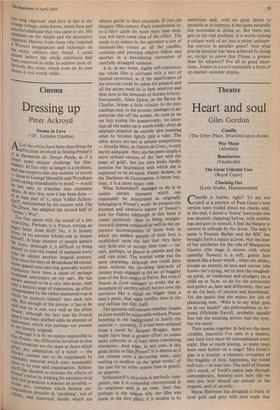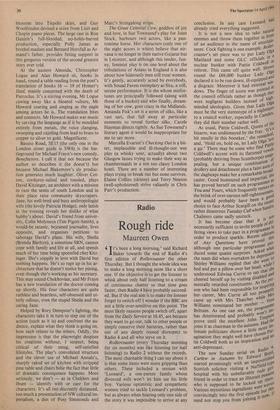Theatre
Heart and soul
Giles Gordon
Camille
(The Other Place, Stratford-upon-Avon)
War Music (Almeida) Benefactors (Vaudeville) The Great Celestial Cow (Royal Court) Checking Out (Lyric Studio, Hammersmith)
Camille is Garbo, right? To me too until at a preview of Pam Gems's new version tears trailed down my cheeks and, at the end, I dared a 'brava' (everyone else was decently clapping) before, with wobbly legs and guts in turmoil, I fled the theatre to recover in solitude by the Avon. The lady's name is Frances Barber and the RSC has brought forth a major actress. Not the least of her attributes for the role of Marguerite Gautier (the stage is strewn with white camellia flowers) is a soft, gentle face shaped like a heart which , when she smiles, reveals an eternity of love and sorrow (she knows she's dying, we've seen the coughed- up gore), of tenderness and drudgery (as a child up at 5a.m. to do for the aristocrats and gentry as, later and differently, they are to do for her), of passion and heartbreak. Yet she insists that she enjoys her job of pleasuring men. 'Who is to say what goes on in our heads?' she philosophises to Ar- mand (Nicholas Farrell, probably equally fine but the amazing actress had my eyes, has my ayes).
Their scenes together in bed are the most credible, beautiful I've seen in a theatre, and their love must be consummated every night. Has so much kissing, so many tears been seen before on a stage? Mrs Gems's play is a stunner, a romantic evocation of the fragility of love, happiness, the world well lost — at least lost. The stuff of Dumas fils's novel, of Verdi's opera seen through contemporary, feminist eyes: how silly we men are, how absurd our pursuit of the orgasm, and of security.
Maria BjOrnson has designed a frieze of tired gold and grey with nine ovals that blossom into Tiepolo skies, and Guy Woolfenden devised a score from Liszt and Chopin piano pieces. The large cast in Ron Daniels's full-blooded, no-holds-barred production, especially Polly James as brothel madam and Bernard Horsfall as Ar- mand's father, provides fitting support in this gorgeous version of the second greatest story ever told.
At the austere Almeida, Christopher Logue and Alan Howard sit, books in hand, round a table reading from the poet's translation of books 16 — 19 of Homer's Iliad, mainly concerned with the death of Patroclus. It's a stirring evening, Mr Logue cawing away like a bloated vulture, Mr Howard soaring and singing as the eagle among actors he is. The translation bites and connects. Mr Howard makes war music by carving the language as if it be moulded entirely from metals, the voice clanging, swooping and cajoling from lead to brass to copper to silver to gold. Magnificent.
Basuto Road, SE15 (the only one in the London street guide is SW6) is the bat- tleground for Michael Frayn's new comedy, Benefactors. I call it that not because the author so describes it (he doesn't) but because Michael Blakemore's sly produc- tion generates much laughter. Oliver Cot- ton, corduroy-suited and tousled, plays David Kitzinger, an architect with a mission to raze the semis of south London and in their place raise community skyscrapers. Jane, his well-bred and busy anthropologist wife (the lovely Patricia Hodge), only latish in the evening reveals her dislike of what hubby's about. David's friend from univer- sity, Colin Molyneux (Tim Pigott-Smith), a would-be satanic, bejeaned journalist, lives opposite, and organises petitions to sabotage David's plans. His wife, Sheila (Brenda Blethyn), a sometime SRN, cannot cope with family and life at all, and spends much of her time being spoonfed chez Kitz- inger. She's soppily in love with David but nothing happens. He's so rapt up in his ar- chitecture that he doesn't notice her pining, even though she's working as his secretary. This may sound Chekhovian, and Mr Frayn has a new translation of the doctor coming up shortly. His four characters are quite ruthless and heartless, self-obsessed and ut- terly odious, even the stupid Sheila and the caring Jane.
Helped by Rory Dempster's lighting, the characters take it in turn to step out of the action (such as it is) and confront the au- dience, explain what they think is going on, how each relates to the others. Oddly, the impression is that the playwright despises his creations without, I suspect, being critical of their smug, self-satisfied lifestyles. The play's convoluted structure and the clever use of Michael Annals's, sharply raked set of kitchen with stripped pine table and chairs belie the fact that little of dramatic consequence happens. More seriously, we don't — as in Chekhov and Ibsen — identify with or care for the characters. It's all too discreetly distanced, too much a presentation of NW cultural im- perialism, a diet of Posy Simmonds and Marc's Stringalong strips.
The Great Celestial Cow, goddess of joy and love, in Sue Townsend's play for Joint Stock, harbours two actors, like a pan- tomime horse. Her characters (only one of the eight actors is white) believe that nir- vana is no longer in their native Gujarat but in Leicester, and although this tender, fun- ny, feminist play is on one level about the tribulations of Asians in England it is also about how hideously men still treat women. It's gently, accurately acted by everybody, with Souad Faress exemplary as Sita, a still, serene performance. It is she whose misfor- tunes are principally followed (along with those of a bucket) and who finally, dream- ing of her cow, goes crazy in the Midlands. Amanda Fisk's set is a series of silks, like a vast sari, that fall away at particular moments to reveal further silks. Carole Hayman directs tightly. As Sue Townsend's literary agent it would be inappropriate for me to say more.
Marcella Evaristi's Checking Out is a bit- ter, implausible and ill-thought-out wee play (a whisky sour, actually) about two Glasgow lasses trying to make their way as chambermaids in a not too classy London hotel. There are a number of interesting plays trying to break out but none survives. Elaine Collins (skinny) and Terry Neason (well-upholstered) strive valiantly in Chris Parr's production.











































 Previous page
Previous page